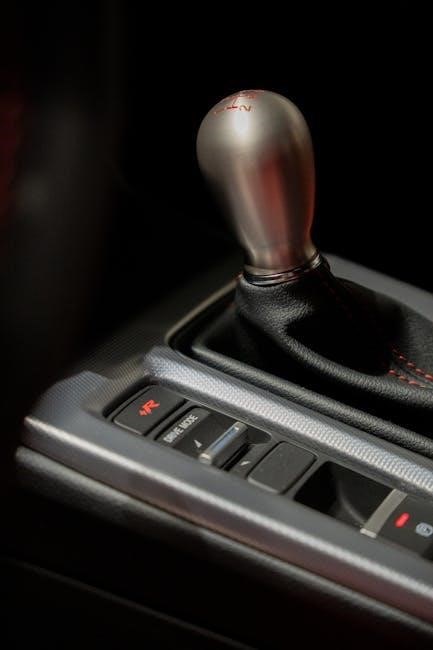The Jeep manual transmission recall affects certain 2018–2023 Wrangler and 2020–2023 Gladiator models, impacting over 69,000 vehicles. This recall addresses critical issues like clutch pressure plate failures and software-related problems, which pose significant safety risks, including fire hazards and unexpected stalling. Vehicle owners are urged to take immediate action to ensure their safety on the road.
Overview of the Recall
The Jeep manual transmission recall was initiated due to critical safety concerns, primarily involving clutch pressure plate failures and software-related issues. Affecting over 69,000 vehicles, including 2018–2023 Wrangler and 2020–2023 Gladiator models, the recall addresses potential fire hazards and unexpected stalling. Jeep has outlined procedures for owners to check if their vehicle is affected and instructed dealers to repair or replace faulty components free of charge to ensure driver safety.

Importance of Addressing Transmission Issues
Addressing the manual transmission issues in affected Jeep models is critical to prevent potential safety hazards, such as fires and unexpected vehicle stalling. Ignoring these problems can lead to further mechanical damage, increasing repair costs and compromising vehicle reliability. Prompt action ensures compliance with safety regulations, protects drivers and passengers, and maintains the overall integrity of the vehicle, preventing long-term consequences and potential legal liabilities.
Affected Models and Model Years
The recall affects Jeep Wrangler (2018-2023) and Gladiator (2020-2023) models equipped with manual transmissions. These vehicles were identified due to specific transmission-related safety concerns;
Jeep Wrangler (2018-2023)
The Jeep Wrangler, model years 2018 to 2023, is included in the manual transmission recall. These vehicles may experience issues such as clutch pressure plate failure, which can lead to fires. Additionally, software-related problems in the manual transmission system have been reported, causing unexpected stalling. Owners are advised to monitor for symptoms like unusual noises, difficulty shifting gears, and vibrations. Prompt action is essential to ensure safety and prevent potential hazards.
Jeep Gladiator (2020-2023)
The Jeep Gladiator, model years 2020 to 2023, is also part of the manual transmission recall. Similar to the Wrangler, these vehicles face issues like clutch pressure plate failure, which can lead to fires. Additionally, software-related problems in the transmission system may cause unexpected stalling. Owners of affected Gladiator models are advised to monitor for symptoms such as unusual noises, vibrations, or difficulty shifting gears and to seek repairs promptly to ensure safety.

Technical Issues Leading to the Recall
The recall stems from clutch pressure plate failures and software-related problems in manual transmissions. These issues can cause mechanical malfunction, leading to safety risks like fires and stalling.
Clutch Pressure Plate Failure
The clutch pressure plate failure is a critical issue linked to the recall. Overheating due to friction plate malfunction can cause fires, while mechanical breakdowns lead to sudden stalling. This defect compromises both safety and vehicle performance, necessitating immediate attention and repair to prevent potential accidents and further damage.
Software-Related Problems in Manual Transmissions
Software-related issues in manual transmissions have led to unexpected stalling and loss of vehicle control. These problems stem from faulty transmission control module programming, affecting gear engagement and disengagement. The recall addresses these glitches to ensure smooth operation and prevent sudden stalls, which can increase the risk of accidents. Reprogramming the software is a key part of the solution to restore proper transmission function and driver safety.

Safety Risks Associated with the Recall
The recall highlights critical safety risks, including fire hazards from clutch malfunctions and sudden vehicle stalling, which can lead to accidents and injuries. Addressing these issues is urgent to ensure driver and passenger safety on the road.
Fire Hazards Due to Clutch Malfunction
The recall addresses fire risks caused by clutch pressure plate failures in Jeep Wrangler (2018-2023) and Gladiator (2020-2023) models. Malfunctioning clutches can overheat, potentially igniting nearby flammable materials. This issue poses a serious safety risk, necessitating immediate attention to prevent accidents and ensure vehicle safety.
Vehicle Stalling Incidents
Vehicle stalling incidents have been reported in Jeep Wrangler (2018-2023) and Gladiator (2020-2023) models with manual transmissions. Faulty software in the transmission system can cause sudden stalling, increasing the risk of accidents. This issue, linked to previous recalls, underscores the need for immediate action to ensure driver safety and prevent potential collisions. Owners are advised to monitor their vehicles and contact dealers for necessary updates or repairs to address this critical concern.
Recall Process and Procedure
Jeep owners can check recall status via the official website by entering their VIN. Dealerships will inspect and repair affected vehicles, replacing faulty components and updating software free of charge.
How to Check if Your Vehicle is Affected
Visit the official Jeep website and navigate to the recall section. Enter your Vehicle Identification Number (VIN) to check if your Jeep is part of the manual transmission recall. You can also contact a local Jeep dealership or refer to notifications sent by the manufacturer. This process ensures you verify your vehicle’s status and schedule necessary repairs promptly.
Steps to Follow for Repair and Replacement
Once your vehicle is confirmed affected, contact a certified Jeep dealership to schedule a service appointment. The dealership will replace the faulty clutch pressure plate and update the transmission software free of charge; Owners are advised to avoid driving the vehicle until repairs are made to prevent potential fires or stalling incidents. The process typically takes a few hours, and loaner vehicles may be provided upon request.

Symptoms of a Failing Manual Transmission
Common indicators include unusual noises, vibrations, and difficulty shifting gears. These issues often lead to stalling or loss of control, necessitating immediate attention to ensure safety;
Unusual Noises and Vibration
Drivers may notice grinding, clunking, or whining sounds when shifting gears. Vibrations during acceleration or deceleration can also occur, indicating worn or failing transmission components. These symptoms often escalate over time, signaling potential clutch or gear damage. If left unaddressed, they may lead to complete transmission failure, emphasizing the need for prompt inspection and repair to avoid further complications.
Difficulty Shifting Gears
Difficulty shifting gears is a common symptom of the manual transmission issue in affected Jeep models. Drivers may experience hesitation or stiffness when moving between gears, particularly during acceleration or deceleration. This problem is often linked to faulty clutch pressure plates and software glitches, which can lead to inconsistent or failed gear engagement. Addressing these issues promptly is crucial to prevent further transmission damage and ensure safe vehicle operation.
Comparison with Other Jeep Transmission Issues
This recall focuses specifically on manual transmission problems, unlike previous issues that involved automatic transmissions or other systems. The severity of clutch and software-related faults makes this recall distinct.
Differences from Previous Transmission Recalls
This recall is distinct due to its focus on manual transmissions, unlike earlier recalls addressing automatic systems. The clutch pressure plate failure and software issues are unique to this campaign, posing fire and stalling risks not seen in previous actions. The specific models affected and the severity of potential hazards set this recall apart from others in Jeep’s history.
Unique Aspects of the Manual Transmission Recall
The recall specifically targets manual transmissions, focusing on clutch pressure plate failures and software glitches. These issues are unique to manual models, unlike previous recalls. The risk of fire due to thermal events and sudden stalling incidents highlights the urgency. Additionally, the recall’s scope includes both Jeep Wrangler and Gladiator models, emphasizing a broader impact on manual transmission vehicles compared to past actions.

Ongoing Issues and Updates
The Jeep manual transmission recall remains ongoing, with updates addressing unresolved clutch and software issues. Affected models continue to face risks, prompting Jeep to monitor and implement fixes.
Current Status of the Recall
The Jeep manual transmission recall remains ongoing, affecting 2018–2023 Wrangler and 2020–2023 Gladiator models. Over 69,000 vehicles are impacted due to faulty clutch pressure plates and software glitches, which can cause fires and unexpected stalling. Jeep continues to address these issues, with repairs and updates being implemented to ensure driver safety and prevent further incidents.

Future Plans for Resolution
Jeep plans to continue addressing the manual transmission recall by providing necessary repairs and software updates. Dealerships will inspect and replace faulty clutch components and reprogram the Powertrain Control Module (PCM) to prevent further malfunctions. Vehicle owners will be notified to schedule appointments, ensuring all issues are resolved promptly. Jeep remains committed to resolving this matter to prevent future incidents and maintain customer trust.

Impact on Jeep Owners and Buyers
The recall raises safety concerns for current owners and may affect resale values due to ongoing transmission issues, potentially deterring new buyers.
Consequences for Vehicle Owners
Owners face increased safety risks, including potential fires and sudden stalling, requiring immediate attention. Affected Jeep Wrangler and Gladiator models may need extensive repairs, causing inconvenience and potential financial burdens. The recall also raises concerns about long-term reliability, impacting owner confidence and possibly affecting resale values. Additionally, the need for software updates or hardware replacements adds to the financial and logistical challenges for vehicle owners.
Effect on Resale Value
The recall may negatively impact the resale value of affected Jeep models, as unresolved transmission issues deter potential buyers. Dealerships may hesitate to sell vehicles with open recalls, and private sales could face challenges due to perceived reliability concerns. Owners may experience lower trade-in values or difficulty selling their vehicles until the recall is resolved, affecting the overall market demand for these models.
The Jeep manual transmission recall highlights critical safety and reliability concerns for affected Wrangler and Gladiator models. Addressing these issues promptly is essential for owner safety and maintaining vehicle value.
The Jeep manual transmission recall affects 2018–2023 Wrangler and 2020–2023 Gladiator models, addressing clutch pressure plate failures and software issues. These problems can lead to fire hazards and unexpected stalling, posing significant safety risks. Owners are advised to contact dealers for repairs to ensure vehicle safety and maintain resale value. Prompt action is crucial to prevent potential accidents and protect investments in these vehicles.
Recommendations for Affected Owners
Affected Jeep owners should immediately contact authorized dealerships to schedule repairs. Monitor for symptoms like unusual noises, vibrations, or difficulty shifting gears. Avoid driving your vehicle if you notice signs of transmission failure to prevent potential fires or accidents. Keep your VIN handy to verify recall eligibility. Ensure all software updates and hardware replacements are completed as per the recall instructions to restore safety and performance.
